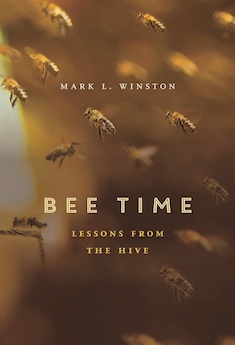By Douglas Whitaker
I – like many people – have little direct contact with bees. I know bees have queens, pollinate flowers, and make honey. I know honey goes well with fresh-baked biscuits, and I know that there more varieties of honey than the one that comes in the plastic bear on supermarket shelves. Beyond these common experiences, I knew very little about bees prior to reading this book. Thankfully, I fall well within the target audience for Bee Time.
The book begins with a concise overview of the importance of bees. Without them, agriculture would look very different: an estimated 65% of all flowering plans require or benefit from pollination be bees. Because of modern society’s reliance upon agriculture, humanity’s millennia-old fascination with bees makes sense. However, there is more to this book than a history or biology lesson.
At its heart, Bee Time is Mark Winston’s love letter to bees. Winston spent his career as an entomologist specializing in bees before he became the director for Simon Fraser University’s newly-created Centre for Dialogue in 2007. As part of his career change, Winston closed his lab and apiaries. While he reports thriving in his new position, he also misses bees, which was one of the key motivations for writing this book.
The other key motivator for Bee Time is colony collapse disorder, a significant threat to bee populations and, in turn, our food supply. Winston describes colony collapse disorder as “a continuing and increasing threat to beekeeping and the numerous crops that rely on bees.” This threat manifests itself as losses of 30% to 40% of all colonies globally each year. The research community has spent years searching for the cause of colony collapse disorder, but it appears that no single cause is to blame. In the chapter devoted to colony collapse disorder (“A Thousand Little Cuts”), Winston reports that the current consensus is that synergy is the real culprit: a complex milieu of causes, each individually manageable, has decimated bee populations. (Technically, decimated is an understatement.)
Winston’s conclusion is that the interactions between diseases, medicinal treatments for diseases, pesticides, and highly-standardized modern agriculture are to blame for the serious decline of bees. Predictably, the proposed solution for such a complex problem is also complex and involves a paradigm shift away from crop monocultures and heavy pesticide use to a more balanced, harmonious approach to agriculture and beekeeping. Such a change will not happen overnight, and Winston cautions against simplifying problems to allow for a straightforward solution.
The “lessons from the hive” that are promised in the subtitle are not all grand statements about balance and harmony with nature. In the latter half of Bee Time, Winston describes the role of bees in the arts and culture as well as connections to socialization and conversation. Lessons that have been learned from bees include breaking complex problems into simpler parts that can be solved individually and linked together, being present in the moment, and conversing deeply. Winston freely admits that beekeeping does not hold a monopoly on such lessons; instead, bees are source of knowledge and inspiration for some as “yoga, meditation, [and] running marathons” are for others.
Beekeeping is a pastoral, contemplative occupation, and this book is a reflection on Winston’s many years of beekeeping experience. Each chapter is filled with descriptions of the scientific or historical aspects of bees under examination with anecdotes from Winston’s time as an entomologist and beekeeper sprinkled throughout. Even when describing his research with “Killer Bees” in French Guiana or the largest food fraud in US History, Bee Time is calm and deliberate, serving as a source of information rather than sensationalism. Bees, and our relationship with them, are fascinating without embellishment, and Winston recognizes this.
Bee Time also benefits from Winston’s time as an academic: the chapters are sensibly organized and could be read individually as part of courses dealing with topics such as sustainability, communication, religion, and urban planning, to name a few. References for each chapter and a good index are included at the back of the book.
Winston’s Bee Time offers a fascinating glimpse of the world of bees and the myriad connections that humans and bees share. More than simply honey-producers, bees are critical for modern human society because of the pollination they provide for agriculture. We also see in bees a reflection of ourselves and endow them with a special place in our culture. Bee Time serves as a great overview of both the biological and social aspects of bees written by someone who clearly loves them.




